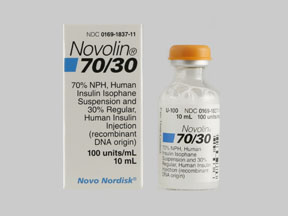
Novolin 70/30 Coupons & Savings Card – Discount Prices from $50.32
My prescription
Edit
10ML of (70-30) 100UNIT/ML, Novolin 70/30 (1 Vial)
Select pharmacy

Albertsons
$50.32
COUPON PRICE
Walgreens
$50.32
COUPON PRICENovolin 70/30 savings card
Show this card to your pharmacist
Albertsons
$50.32
BIN
ID
PCN
GRP
011867
LHA2D80254
HT
LABH001
Powered by
More prescriptions for diabetes type 2
More prescriptions for diabetes type 2
Price history for Novolin 70/30
1 Vial, 10ML of (70-30) 100UNIT/ML
Average retail price for Novolin 70/30
Average SaveHealth price for Novolin 70/30
Our price history data is based on aggregated prescription data collected from participating pharmacies in America. Our prescription data updates daily to reflect the latest price changes. If you notice a missing data point, it means there wasn't sufficient data available to generate a monetary value for that date.
*Retail prices are based on pharmacy claims data, and may not be accurate when we don't have enough claims.
Novolin 70/30 dosage forms
Dosage Quantity Price from Per unit 10ML of (70-30) 100UNIT/ML 1 Vial $52.03 $52.03 10ML of (70-30) 100UNIT/ML 2 Vials $102.06 $51.03 10ML of (70-30) 100UNIT/ML 3 Vials $152.09 $50.70
| Dosage | Quantity | Price from | Per unit |
|---|---|---|---|
| 10ML of (70-30) 100UNIT/ML | 1 Vial | $52.03 | $52.03 |
| 10ML of (70-30) 100UNIT/ML | 2 Vials | $102.06 | $51.03 |
| 10ML of (70-30) 100UNIT/ML | 3 Vials | $152.09 | $50.70 |
Is novolin 70 30 short or long acting?
Novolin 70/30 is a combination insulin that contains both intermediate-acting and short-acting insulin. It consists of 70% NPH insulin, which is intermediate-acting, and 30% regular insulin, which is short-acting.
Is novolin 70 30 the same as novolog?
Novolin 70/30 and Novolog are not the same. Novolin 70/30 is a premixed insulin that contains 70% NPH insulin and 30% regular insulin. Novolog, on the other hand, is a rapid-acting insulin known as insulin aspart. They have different onset, peak, and duration times, and are used differently in diabetes management. It is important for patients to follow their healthcare provider's instructions regarding insulin use.
What is the difference between Humulin 70 30 and Novolin 70 30?
Humulin 70/30 and Novolin 70/30 are both premixed insulin products that contain 70% NPH insulin and 30% regular insulin. The primary difference between them is the manufacturer. Humulin 70/30 is produced by Eli Lilly and Company, while Novolin 70/30 is produced by Novo Nordisk. Both are used to control blood sugar levels in individuals with diabetes and have similar onset, peak, and duration of action. However, patients should follow their healthcare provider's recommendations regarding which product to use, as there may be individual preferences or insurance coverage considerations.
Does 70/30 insulin cause weight gain?
Yes, 70/30 insulin can cause weight gain. Insulin therapy, including 70/30 insulin, can lead to weight gain as it helps the body store glucose, which can increase fat storage. Patients should discuss any concerns about weight gain with their healthcare provider to manage their diabetes treatment effectively.
What does Novolin do to the body?
Novolin is a type of insulin used to help control blood sugar levels in individuals with diabetes. It works by facilitating the uptake of glucose into the cells, thereby lowering blood sugar levels. This helps the body use glucose for energy and prevents complications associated with high blood sugar.
